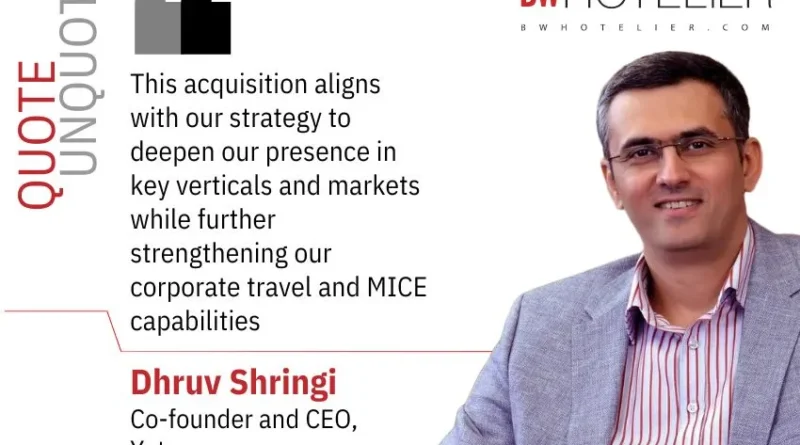Yatra Shifts Focus to High-Value Corporate Clients
With a vision to expand its corporate travel sphere, Yatra, an online travel platform based in India, plans to concentrate its resources on acquiring and retaining high-value, repetitive corporate clients. Dhruv Shringi, the CEO, outlines the principal strategy as deviating from the pursuit of price-sensitive leisurely customers to the prioritization of corporate clientele. The company aims to make its platform an integral part of corporate client’s daily routines, thereby building a model where switching costs are high. Such an approach would require substantial efforts from a customer to switch from Yatra’s services, thus making customer retention highly probable.
The company’s commitment to this strategy is evident in its quarterly results from the period ending June 30. Yatra reported a sizeable sector of its gross bookings emanating from B2B transactions. Shringi shares that approximately 67% of the total gross bookings where B2B engagements, projecting a possible move towards a 70% share by the end of the current fiscal year.
As part of the company’s strategy to increase customer engagement, Yatra aims to foster deeper technical integration with corporate clients, thereby promoting a higher degree of online penetration. The goal is to encourage companies to digitize their travel processes, providing a unique advantage to Yatra over its competitors. The approach encompasses the usage of advanced technology to facilitate the penetration of digital adoption extensively across various sectors.
With a majority of competitors still following the traditional method, which utilizes a minimal level of integration, Yatra finds ample opportunities to embed itself into the digital wave sweeping across the industry. Shringi insists that the competition’s offline servicing further validates the company’s strategy and justifies the significant potential for expansion in this field.
Yatra recently intensified its efforts of diving deep into the corporate travel market with the acquisition of ‘Globe All India Services,’ also known as Globe Travels. The purchase of the corporate travel services provider, which cost Yatra INR 1.28 billion ($15.25 million) in cash, squarely situates the company in a strong position to foster long-standing relationships with corporate clients.
Yatra’s approach significantly repositions its ongoing efforts. While online travel platforms often lure in consumers with appealing discounts and aggressive marketing techniques, Yatra is rewriting the rules. Preferring a business model built around long-term client engagements, Shringi remarks that a lion’s share of the company’s top clients display a long tenure, underscoring the effectiveness of Yatra’s strategy.
Shringi presents impressive statistics to validate the successful implementation of the company’s strategy. According to him, ‘Out of our top 100 customers, a whopping 73 have been with us for over five years.’ These enduring relationships provide the company with a predictable revenue stream and operational leverage, once technical integrations are effectively negotiated.
In terms of client retention, Shringi boasts of strikingly high annual retention rates for the corporate travel sector, a figure upward of 97%. The company acknowledges that such a high retention rate is beneficial in gaining significant operational leverage in their business model.
Yatra’s strategic pivot has led to impressive margin improvements, primarily driven by two factors. First, the company reduced its practice of direct discounting to its customers, opting to rely more on attractive offers conveyed through banking partners and marketing associates. This strategic alteration significantly reduced Yatra’s customer acquisition costs.
The other factor driving margin improvement is the company’s strategic readjustment of its business mix, tilting more towards higher-margin products such as corporate airfares, accommodation, and packaged travel deals. Shringi noted, ‘The net margins of hotel bookings and package deals are around 11%, starkly higher than airfares which typically hold a net margin of 3%-4%.’
Through the implementation of these strategic changes, Yatra witnessed a significant increase in the company’s net margin and revenue-after-cost metrics, outperforming its raw growth in gross bookings. Shringi highlighted the fact that their portfolio’s shift towards hotel bookings and package deals has considerably increased from 15% to 20% of total gross bookings within a year.
Yatra’s recent quarterly financial figures revealed a modest yearly growth in total gross bookings, around 9%. This number indicates a reversal from previous declines in total volume. However, the recuperation was not uniform as air ticketing businesses experienced only a moderate improvement, while sectors like accommodation and package deals saw a more robust growth.
Looking ahead, Yatra aims to leverage its strength in the hotel sector to stimulate immediate growth. A recent trend has seen several corporate clients initially attracted by the company’s hotel services which subsequently paved the way for more comprehensive travel services. The company finds hotel and package deals as sectors carrying higher profits and easier cross-selling attributes.
Revisting important numbers from the quarter, the company’s revenue from operations saw a significant increase of 108% year-on-year, amounting to INR 2.1 billion ($24 million). Additionally, the adjusted EBITDA rose by 138% year-on-year up to INR 249 million ($2.8 million), with a net profit increase of 296% compared to the same period the previous year, rounding off at INR 160 million ($1.8 million).
On a final note, Yatra managed to expand its corporate client base by adding 34 new corporate accounts during this quarter alone. These new accounts potentially add an annual turnover of INR 2 billion ($23 million). This further illustrates the company’s successful strategic shift towards catering high-value corporate customers, laying the foundation for continued growth.



